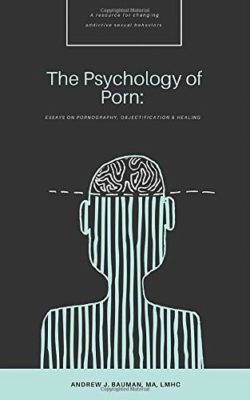By Andrew Bauman

I come from the first generation where Internet pornography entered our homes with staggering regularity. The pattern of pornography use begun in that era has shown no sign of slowing down. As Belinda Luscombe writes in her Time article Porn and the Threat to Virility, an independent web-tracking company totaled the number of U.S. visitors to porn sites at around 58 million per month in February 2006. Then, ten years later, the number was 107 million. That is 107 million visitors per month in the U.S. alone!
This amount of consumption has distorted my own sexual development and that of millions of young men and women who grew up engrossed in a pornified society. The consequences have been dire and are just starting to come to the surface, as addicted millennials have begun to marry and attempt to attain healthy relationships.
One of the chief consequences is the development of a Pornographic Style of Relating (PSR). This style of relating is learned when pornography becomes your primary teacher or guide in your sexual development. We learn certain ways of being, and then those ways are unconsciously lived out in relationship. I will briefly discuss six ways of living out of a PSR, and also examine what those categories look like when they are overcome in healthy relationship.
The first category of a PSR is that of control—rooted in being the only one in the dynamic, which is a non-mutual relationship alone with imagery. When you are by yourself masturbating to images, there is no one else to satisfy, no one else to consider, and you get to control the entire scene. The set-up, the romance, the rituals, the climax are in your power. This creates an innate selfishness and an unconscious desire for absolute control over intimate relationship. In a restored sexuality, this category becomes freedom, rooted in a maturity and the security of both partners, allowing each to choose to come and go and know the inherent goodness of the other.
The second category of a PSR is objectification. Over the years, we look at thousands upon thousands of images; those bodies become seared into our brains over time, and we become desensitized. Research has also revealed that our brain’s dopamine receptors shrink in response to chronic overstimulation, meaning it becomes more difficult for us to experience pleasure (from any stimulus). In pornography, the unknown bodies have no names or stories and have become means to an end, serving only the purpose of attaining orgasm. After they no longer serve a purpose, they are cheaply discarded. This pornographic development leads to dehumanizing sexual behavior and non-positive views of women, and causes those with a PSR to chronically jump from relationship to relationship (just like clicking from pornographic image to pornographic image), looking for perfection and completion to be found in a person. When healthy sexuality is restored, this category of objectification becomes the category of honor. The partner is respected for their entire being; their voice, opinions, preferences all matter, and equal weight is given to both parties.
The third category of a PSR is speed. The rapid pace of relationships comes to resemble the quick climax of intensity around pornography, the rush and thrill of not getting exposed, an urgency for consummation, and ultimately an abrupt and inevitable ending (normally with shame attached). These traits are opposite to sustaining long-lasting intimacy. The speed of relationship normally involves high emotional and sexual linking without the proper time to grow them deeply, and other areas of relationship such as intellectual and spiritual connections are neglected or completely forgotten. When healthy sexuality is restored, this category becomes gradual—a slow build. A strong foundation of balanced intimacy, growth, tears, laughter, pain, and joy shared together. You grow in love, not accidentally fall in it. These are the things your grandmother taught you, and they could not be more true—or in more opposition to a PSR.
The fourth category of a PSR is hunger. There is a frantic need that must be filled by the other. This cavernous need consumes and devours both partners in an attempt to mend something broken inside. This category shows itself in enmeshed relationships, where no individuation can be found. The hunger drives both parties to consume—rather than delight in—the other. When healthy sexuality is restored, this category becomes desire. Desire is a healthy longing and genuine want of the whole other, not a desperation to fulfill. A litmus test you can try when considering a relationship or when you want to know if you are acting out a PSR would be to recite this sentence, “I want you, but I do not need you to be okay.” If you can confidently say that you will be hurt and disappointed, but ultimately “okay” without the other, you are living out of desire and not misguided famine. At that point, the other person no longer defines who you are but only what you long for.
The fifth category of a PSR is isolation. When we learn our sexuality behind closed doors in the dim light of the computer screen, our sexuality remains hidden, even from ourselves. We come to protect this isolation as some type of sacred space, and even the thought of inviting another human in feels threatening and disruptive. The isolation fuels the secret life and separates us from the loving relationships that we most need. When healthy sexuality is restored, this category becomes communion. This communion is a shared open bond with another person, vulnerably allowing the other into the most guarded territory of your sexuality. Opening your heart to another is an invitation to the real you, what you simultaneously most fear and most long to attain.
The sixth and final category of a PSR is that of fantasy. Fantasy is an escape from what is real. Whether it be difficult emotions, such as stress, anxiety, or depression, or just the pain that genuine relationship inevitably brings, fantasy relieves those struggles for a moment. While healthy relationships live in the truth, pornography helps bolster a life of fantasy that is difficult to undo. Fantasy brings relief but does not bring restoration. When healthy sexuality is restored, this category becomes authenticity. For relationships to remain thriving and true, both partners must be committed to voicing complaints, hopes, and desires, and living into what is most true. When one partner is still living out of a PSR, there is little to no chance that the couple can tackle what needs to addressed in the relationship.
My hope is that, whether you yourself are an addict or you are attempting to be in relationship with one, these categories can bring an awareness and empower you toward action, ultimately owning your part in how you relate to the world and beginning the process of transformation that you were most meant for.
***

Andrew J. Bauman is Co-Founder & Director of the Christian Counseling Center: For Sexual Health & Trauma (CCC). He is a licensed mental health counselor with a Master of Arts in Counseling Psychology from The Seattle School of Theology & Psychology. He is currently working on his doctorate from Northeastern University. Andrew is the author of four books, Floating Away: A Book to Help Children Understand Addiction, Stumbling Toward Wholeness, The Psychology of Porn, and (with his wife, Christy) A Brave Lament. You can find out more about his work at www.andrewjbauman.com and www.ChristianCC.Org.
